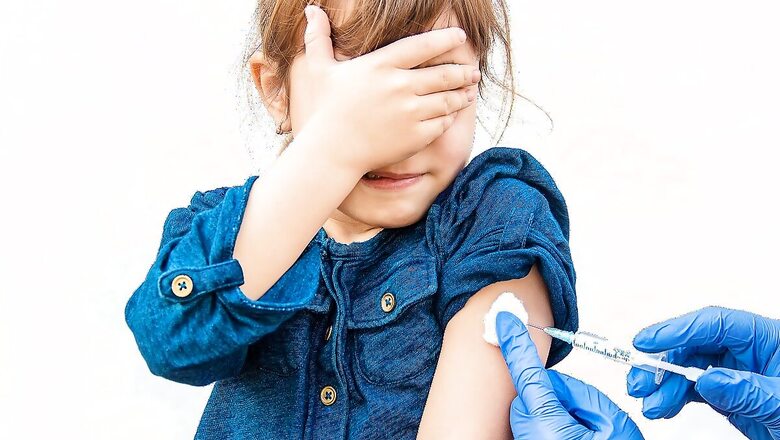
views
India is a vast and populous country, with an estimated population of more than 1.3 billion. Almost 35.29 per cent of this population is below 20 years of age. For any country, vaccinating more than one billion of its people with two doses of a vaccine would prove to be a humungous challenge.
Even as the COVID-19 pandemic continues to rage in parts of India, predictions of a third (even more deadly) wave hitting our shores, with children as the main sufferers, have had us all worried. However, opinion on this claim is divided, with the Indian Academy of Paediatrics (IAP) issuing an advisory stating that although children are as susceptible to COVID infection as older individuals, concerns about the third wave “predominantly or exclusively affect(ing) children” were misplaced, and “there was no evidence to suggest that most children with COVID-19 infection will have severe disease in the third wave”. The IAP, however, went on to warn that, “After the second wave is over, if we do not continue following COVID-appropriate behaviour, the third wave, if it occurs, is likely to infect the remaining non-immune individuals—that may include children also.”
As per a UNICEF report, which compiled COVID-19 data from 100 countries from January 2020 till March 2021, paediatric cases accounted for almost 11 million (13 per cent) of the total 80 million cases at the time. Further, more than 6,800 children and adolescents died due to COVID-19 (0.3 per cent of the 2.3 million COVID-19 deaths) in 78 countries. Government data collected from January 1-April 21 revealed that around 12 per cent of the 5.6 million confirmed cases of COVID-19 in India were reported in those below 20 years of age.
Barring some cases of severe disease and complications, like multisystem inflammatory syndrome in children (MIS-C), the impact of COVID-19 infection, thus far, has been relatively milder on children as compared to adults and the elderly. The theory about children, particularly younger kids, being super-spreaders of SARS-CoV-2 has also largely been trounced. However, based on accumulating evidence that vaccines might block transmission of SARS-CoV-2, several experts, the world over, favour vaccinating children and adolescents against COVID-19 in view of the fact that the emergence of rapidly-spreading coronavirus variants along with improved vaccine coverage among the adult population may soon force the virus to find newer ways to survive and spread. It is, therefore, foreseeable that children and adolescents, in the near future, might contribute more to COVID-19 spread, unless we block transmission pathways by vaccinating this important subgroup.
With achievement of better control over the pandemic, most countries, including India, will soon be opening up their markets, businesses, offices and other establishments, including educational institutions. Before such steps are taken, it is imperative that we protect the vulnerable by encouraging and enforcing COVID-appropriate behaviours (CAB) as well as improve and expand the vaccination coverage in time to achieve herd immunity across all the groups that potentially contribute to transmission. The US Centre for Disease Control (CDC) acknowledges that “widespread vaccination is a critical tool to help stop the pandemic” and “recommends everyone 12 years and older should get a COVID-19 vaccination to help protect against COVID-19.”
Children are not “mini adults” but unique individuals in themselves. It may, therefore, be imprudent to extrapolate the safety and efficacy data from trials of any intervention conducted in young adults and older populations to children. This holds true even more for results of vaccine-related trials where “leaping” without first “looking adequately” and also “long enough” may prove counter-productive. Added to this are questions regarding the advisability of exposing a young kid’s still-developing immune system (unnecessarily) to a vaccine in the absence of sufficient, good-quality evidence for its use, usefulness or safety, a view also supported by the World Health Organisation (WHO). Recently, in May this year, WHO chief Dr Tedros Adhanom Ghebreyesus speaking at a virtual conference in Geneva said that while he understood why some countries wanted to vaccinate children and adolescents, but right now, he would urge them to reconsider. He went on to add, “Wealthier nations should postpone plans to give children and teenagers Covid vaccines and instead donate supplies to low-income countries”.
COVID Vaccination for Children: Current Status
The Pfizer-BioNTech COVID-19 vaccine (mRNA COVID-19 vaccine) is the first and only vaccine in the world, so far, to be approved for the 12-15 year age group. The doses recommended for children are same as adults, with two shots administered three weeks (21 days) apart. In a press release issued by Pfizer-BioNTech on March 31, the vaccine was reported to be 100 per cent effective in a Phase-3 study involving 2,260 children in the age group of 12-15 years. Currently, the company is conducting trials on children aged 6 months to 11 years, and expects to seek an Emergency Use Authorisation (EUA) for its vaccine for this age group later this year.
On May 5, Canada became the first country to approve the Pfizer vaccine for children aged 12 and above. On May 12, the Advisory Committee on Immunization Practices’ (ACIP) issued an interim recommendation for use of Pfizer-BioNTech COVID-19 vaccine (mRNA COVID-19 vaccine) in adolescents, aged 12-15 years under the US Food and Drug Administration’s (FDA) EUA. Recently, on May 28, the European Medicines Agency (EMA) also gave its nod to the Pfizer-BioNTech vaccine for children aged 12-15.
Although COVID-19 vaccines have been proved to be safe and highly effective, CDC is monitoring reports of Myocarditis (inflammation of the heart muscle) and Pericarditis (inflammation of the pericardium) in adolescents and young adults after COVID-19 vaccination. It states, “The known and potential benefits of COVID-19 vaccination outweigh the known and potential risks, including the possible risk of myocarditis or pericarditis.”
As per the currently available CDC recommendations on the Pfizer-BioNTech vaccine, COVID-19 vaccines and other vaccines may be administered together without regard to timing, and if multiple vaccines are administered at a single visit, each injection must be administered in a different injection site. For adolescents and adults, the deltoid muscle can be used for more than one intramuscular injection. Regarding COVID vaccination in children with history of MIS-C, the CDC states that one may choose to vaccinate such children with the following considerations:
* Clinical recovery from MIS-C or MIS-A, including return to normal cardiac function
* Personal risk of severe acute COVID-19 (e.g., age, underlying conditions)
* Level of COVID-19 community transmission and personal risk of re-infection
* Lack of safety data of COVID-19 vaccines following these illnesses
* Timing of any immuno-modulatory therapies
On May 25, Moderna, another US manufacturer of COVID-19 vaccine, also released results of second and third-stage trials of a TeenCOVE study conducted on 3,732 children. As per their report, Moderna COVID-19 vaccine was observed to be 100 per cent safe and effective for children aged between 12 and 17. The company is slated to apply to the US FDA and other regulatory bodies across the world for approval in June. If approved, Moderna’s will be the second vaccine approved for teenagers in the US. The company is also currently conducting a KidCOVE study: a Phase-2 COVID-19 vaccine study on children between 6 months and 11 years. The Johnson & Johnson’s COVID-19 vaccine, which too has FDA’s EUA for use in adults, expanded its vaccine trial in April to include 12- to 17-year-olds. The results are still awaited. AstraZeneca had also announced trials of its vaccine on children aged six to 17 some time ago in UK. The trial, however, had to be halted on April 7 amid fears of links to a rare blood clot.
COVID Vaccination for Children: Where India Stands
Currently, only three COVID-19 vaccines are approved for use in India, Covaxin (India’s indigenous COVID-19 vaccine by a Hyderabad-based firm, Bharat Biotech, developed in collaboration with the Indian Council of Medical Research), Covishield (the Indian variant of the Oxford-AstraZeneca vaccine manufactured locally by the Serum Institute of India), and Sputnik V (developed by Moscow’s Gamaleya Institute, Russia). None of these, however, are approved for use in individuals below 18 years of age.
The Pfizer COVID-19 vaccine is still pending regulatory approval in India. In its submission seeking fast-track approval for its vaccine, the company informed the Indian authorities about the “high effectiveness” of its vaccine against the novel coronavirus variant prevalent in India. In another relevant development, the US FDA on May 19 authorised the storage of undiluted, thawed Pfizer-BioNTech COVID-19 vaccine vials in the refrigerator at 2°C-8°C (35°F to 46°F) for up to 1 month, putting to rest concerns regarding the practicality and feasibility of using this vaccine, which requires stringent storage temperature conditions of -70◦ C ± 10◦ C for up to 10 days, when unopened.
It was only recently the Drugs Controller General of India (DGCI) granted permission to Bharat Biotech for the phase 2-3 clinical trial of its whole-virion inactivated SARS-CoV-2 vaccine (Covaxin) on children between 2 and 18 years of age. This open label, multicenter study to evaluate the safety, reactogenicity and immunogenicity of Covaxin shall be conducted on 525 subjects across various testing sites including AIIMS Delhi, AIIMS Patna, and Meditrina Institute of Medical Sciences, Nagpur.
However, as per the information available on the official website of Clinical Trial Registry of India (CTRI), this proposed paediatric Covaxin trial, unlike the adult phase-3 trial of Covaxin conducted earlier in India or most paediatric COVID vaccine trials carried out elsewhere in the world, is neither a randomized, placebo-controlled trial nor does it seek to study the effectiveness of the shot in preventing COVID infection or disease. Mere generation of antibodies following vaccination may not necessarily be a proof of protection against COVID. As per US FDA safety communication dated May 19, 2021, “Currently authorized SARS-CoV-2 antibody tests have not been evaluated to assess the level of protection provided by an immune response to COVID-19 vaccination.”
Reportedly, Ahmedabad-based Zydus Cadila is also planning a paediatric trial for its COVID vaccine (ZyCoV-D) in children between 5 and 12 years of age. Besides the safety and efficacy data, we also hope to seek answers on some other pertinent issues like reactogenicity and desirability of co-administration of these indigenous COVID vaccines with routine childhood immunizations (without interfering with immunity generated by routine childhood vaccinations); advise on COVID vaccination in children receiving long-term medication, monoclonal antibody or immune-suppressive agents (like steroids) or those with co-morbidities or malnutrition etc.; the safety and efficacy of COVID vaccines in children with a history of multisystem inflammatory syndrome (MIS-C); the desirable time gap between suspected or confirmed COVID infection and COVID vaccination etc.
Since, the results of proposed Covaxin trials on children are still some time away, the best and, currently, the only way to protect our children is to religiously adhere to COVID-appropriate behaviours (CAB), which include: correct and appropriate use of masks, proper hand washing and use of alcohol-based sanitizers, staying at home, maintaining physical distancing, avoiding gatherings, group play, and functions etc. Improved vaccination coverage in adults shall also serve to substantially cut down the COVID transmission rates in the country.
Other Novel Strategies for COVID Vaccination
Besides, the injectable vaccines, scientists and drugmakers are also working on finding other novel ways to prevent the infection by means of oral tablets, capsules or drops and nasal sprays. Development of non-invasive alternative methods are expected to improve the ease of administration, storage and transport of vaccines as well as dramatically increase vaccine acceptability and coverage, besides eliminating the risk of needle-related injuries. These vaccines target the mucosal immune system, which serves as the first line of defence against invading microorganisms. The major advantage of mucosal vaccines is they could create a strong immune response and stop the virus at the initial entry point (the nasopharyngeal mucosa) itself, thereby stopping its spread to the lungs. Besides this, nasal vaccines could also cut down transmission of the virus by reducing viral shedding.
Although some studies conducted on rodents, rhesus macaques and hamsters, using nasal spray vaccine, do show promising results, research employing these alternative routes for COVID vaccination is still at the nascent stage. As per data released by the WHO on May 5, clinical trials are underway for eight intranasal vaccines in the US, UK, China, India, Iran and Cuba. A phase-1 trial employing two doses of BBV154 vaccine, a month apart, is currently being conducted by Bharat Biotech in healthy Indian adults.
Currently, only two intranasal vaccine candidates are in phase-2 clinical trial stage. One is being developed by the University of Hong Kong, Xiamen University, and the Beijing Wantai Biological Pharmacy Enterprise, in partnership with the Coalition for Epidemic Preparedness Innovations (CEPI). The second vaccine is being developed by Razi Vaccine and Serum Research Institute in Iran.
The picture for these non-injectible vaccines, however, may not be as rosy as one would be inclined to believe. Past experience with intranasal flu vaccine (Flumist) has shown that these vaccines may be limited by their inability to produce effective and long-lasting immunity. Moreover, factors like the acidic environment of the upper gastro-intestinal tract and sticky layers of mucous in the respiratory system may negatively influence the ability of vaccines utilizing these routes to access and stimulate the mucosal immune system, resulting in poorer immunogenicity and faster waning immunity. Furthermore, closer proximity to the brain also raises some serious safety concerns with vaccines employing the intranasal route. Reports of increased risk of Bell’s Palsy (involvement of facial nerve) had led to discontinuation of Berna Biotech’s inactivated intranasal influenza vaccine in the past.
Read all the Latest News, Breaking News and Coronavirus News here.



















Comments
0 comment